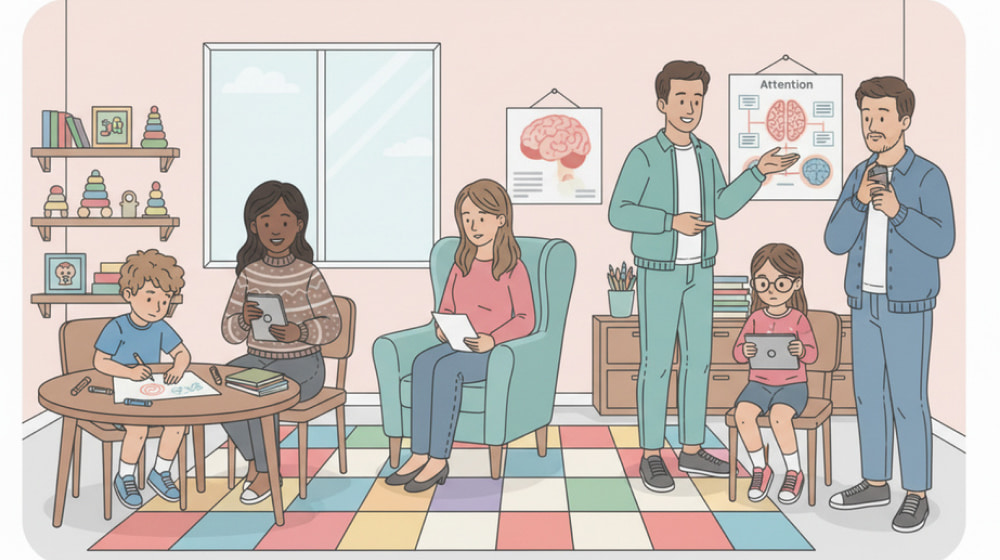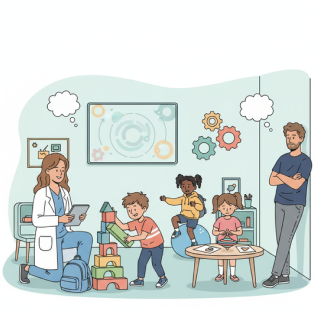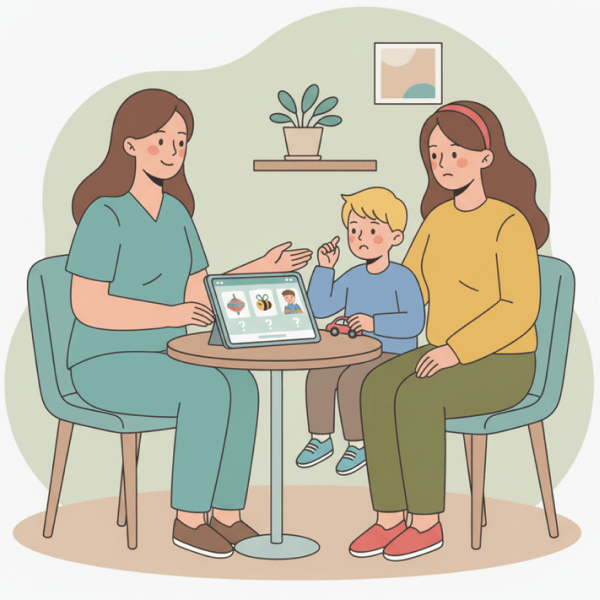Understanding ADHD in Childhood: What Is It?
Every child’s story is different, which is why a strengths-based lens helps tremendously. Many learners show exceptional creativity, empathy, and resilience once given the right structure and outlets. In many communities, the conversation still focuses only on deficits, yet a balanced perspective changes outcomes. Families and teachers who see patterns early can reduce friction and build momentum. In that spirit, discussions about assessments can be more humane and holistic for ADHD in children, centering dignity and growth rather than stigma or blame.

Guiding Kids Toward Success
Early guidance makes a difference, but so do realistic expectations. Kids benefit when adults model calm problem-solving and break tasks into steps. Over time, the combination of coaching, routines, and strategic feedback creates a foundation for success. When challenges arise, thoughtful collaboration among caregivers, educators, and health professionals ensures each child is seen, heard, and supported.
Start the TestChild ADHD Questionnaire: Insights for Learning and Growth
Families sometimes discover that structured reflection highlights gifts as well as needs. Thoughtful tools prompt observations from parents and teachers that surface patterns of motivation, social strengths, and learning preferences. That broader view helps teams design opportunities to shine. In practice, this means weaving interests into lessons, offering choice, and using visual supports. Within this balanced approach, insights may be documented through a well-designed child ADHD questionnaire, ensuring that strengths and challenges are considered together.

Everyday Clues, Routines That Work, and Early Support
Consider practical anchors that keep the day moving. Visual schedules lower working-memory demands. Timers and movement breaks reset energy and attention. Bite-sized tasks with immediate feedback sustain momentum. If patterns persist despite supportive routines, families may explore professional input to clarify next steps and discuss the role of ADHD testing for kids within a broader plan for support.
-
![]() Use digital results as conversation starters, not conclusions.
Use digital results as conversation starters, not conclusions. -
![]() Save summaries to share with clinicians and educators
Save summaries to share with clinicians and educators -
![]() Pair screeners with real-world observations and journals.
Pair screeners with real-world observations and journals.
ADHD Test for Children: Evaluation and Diagnosis
Parents often ask how to align medical and educational pathways. The pediatrician can coordinate referrals, and a school team can support accommodations regardless of a medical label. In many clinics, families start with developmental history and rating scales, followed by targeted tasks to observe attention and executive function. Such coordination is a hallmark of high-quality pediatric ADHD testing, where findings translate into actionable plans at home and school.
| Method | What It Provides | Who Uses It | Best For |
|---|---|---|---|
| Clinical Interview | Context, history, daily functioning | Psychologists, pediatricians | Understanding patterns over time |
| Rating Scales | Multi-rater perspectives on behaviors | Parents, teachers, clinicians | Comparing settings and severity |
| Cognitive/Learning Tests | Strengths in memory, processing, and academics | Neuropsychologists, school specialists | Clarifying co-occurring learning needs |
| Classroom Observation | Real-world attention and self-regulation | School psychologists, specialists | Translating data into accommodations |
Families sometimes seek a straightforward screener before a full evaluation. In those cases, a clinician may discuss the role of a kids ADHD test as a preliminary step that informs, but does not replace, a comprehensive assessment. When scheduling and planning with a care team, many caregivers naturally ask about timing, cost, and whether to begin with a pediatrician or a specialist while navigating the ADHD test for my child as part of a responsible, stepwise approach.
Care teams often combine standardized forms with practical tracking. Weekly behavior snapshots, sleep logs, and task-completion tallies can reveal what strategies stick. In many clinics, practitioners incorporate a trusted ADHD questionnaire kids to compare behaviors at home and school, thereby guiding targeted intervention. Some families also request a concise child ADHD test to prioritize next steps before committing to broader evaluation. In collaborative meetings, a specialized ADHD child test may be one element among many, helping clarify whether attention challenges are primary or secondary to other factors.
Start the Test
Quick ADHD Tests for Kids You Can Do Anywhere
Some families prefer brief, mobile-friendly items to gauge patterns across situations like homework, mealtimes, and play. In such cases, a reputable ADHD test kids can serve as a quick snapshot to organize concerns. Others want immediate feedback they can discuss with teachers, and for those families, a carefully vetted ADHD online quiz kids may provide starting insights to bring to an appointment. When comparing options, parents should prioritize evidence-based tools over novelty, especially if they are considering an ADHD quiz for kids to inform next steps and set expectations.

Partnering With Schools: Accommodations and Skills
Regular communication keeps plans responsive. Weekly check-ins, shared progress notes, and predictable routines help everyone stay aligned. If concerns continue despite classroom strategies, a school-based team may suggest additional data collection or referral pathways connected to ADHD testing in children, ensuring that educational supports and clinical insights reinforce one another rather than operate in silos.
ADHD Testing for Kids: Get an Accurate Online Report
Get StartedFrequently Asked Questions
- How do I know whether to seek an evaluation?Look for patterns across settings that persist despite reasonable supports. If morning routines, transitions, or multi-step tasks remain hard and are impacting learning or relationships, an evaluation can clarify needs. After documenting observations, some parents choose to begin with a pediatrician who can coordinate referrals and outline a plan tailored to your family.
- What’s the difference between screening and diagnosis?Screening collects preliminary information to see whether a fuller assessment is warranted. Diagnosis integrates history, rating scales, and sometimes cognitive or learning tests to build a complete picture. Many families start with a brief tool, then pursue a more comprehensive pathway if concerns remain, acknowledging that a ADHD test children by itself does not confirm a condition.
- How should I prepare my child for appointments?Explain that the goal is to understand how their brain works so adults can make school and home easier. Emphasize that there is no “pass or fail,” only information. It can help to bring snacks, breaks, and a favorite activity for downtime, and to share examples of when focusing is easy and when it’s tough.
- Will school accommodations actually help?Yes, when chosen thoughtfully and implemented consistently. Supports such as stepwise instructions, visual cues, and movement breaks reduce cognitive strain and improve engagement. Data collected in the classroom can inform adjustments, and those insights can be shared with clinicians when teams consider testing ADHD in children as part of a coordinated plan.
- Are online quizzes worth using?Online screeners can be useful to organize concerns and prepare for professional conversations. They should supplement not replace clinical evaluation and teacher input. Families often treat results as a roadmap for questions to bring to appointments, using digital summaries to streamline collaboration across home and school.
The Latest News
 Comprehensive Guide to ADHD Testing for Kids What ADHD Testing Involves and Why It Matters Parents and caregivers often sense when attention, impulse control, or hyperactivity challenges are affecting daily life. A thoughtful testing process can illuminate whether these patterns align with ADHD, a neurodevelopmental condition that shows up di...
Comprehensive Guide to ADHD Testing for Kids What ADHD Testing Involves and Why It Matters Parents and caregivers often sense when attention, impulse control, or hyperactivity challenges are affecting daily life. A thoughtful testing process can illuminate whether these patterns align with ADHD, a neurodevelopmental condition that shows up di... - 23 October, 2025
- Comprehensive Guide to ADHD Screening in Children: Clear Steps and Real Benefits Understanding ADHD Screening and Why Early Insight Matters Parents often notice subtle patterns long before a formal diagnosis is considered, such as a child losing track of multi-step instructions, struggling to switch tasks, or fidgeting through seated activities. These observations are valuable...
- 22 October, 2025
- The Complete Parent’s Guide to Online ADHD Quizzes for Kids What an Online ADHD Quiz Is and What It Isn’t Parents and caregivers often look for clear, low-pressure ways to understand attention, hyperactivity, and impulsivity patterns in their children. An online ADHD quiz is best viewed as a screening tool, not a diagnosis. These questionnaires transl...
- 21 October, 2025
Please Note
This website (adhdtestingkids.com) is not an official representative, creator or developer of this application, or product. All the copyrighted materials belong to their respective owners. All the content on this website is used for educational and informative purposes only.


